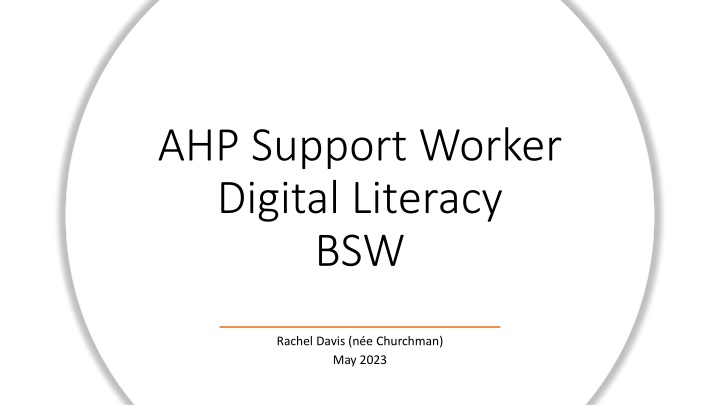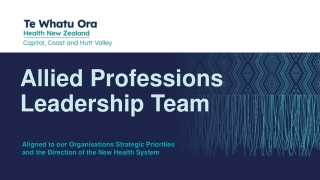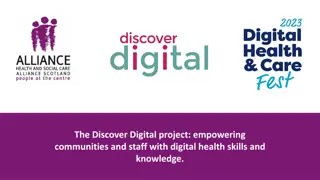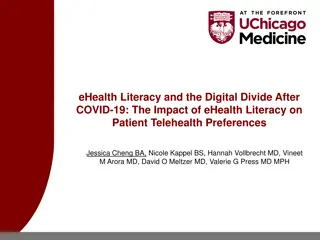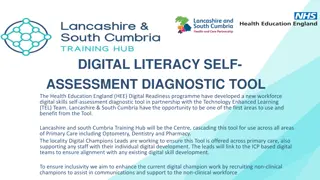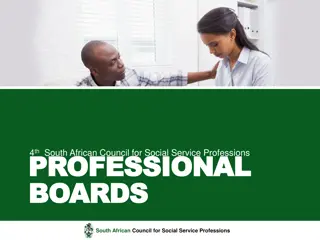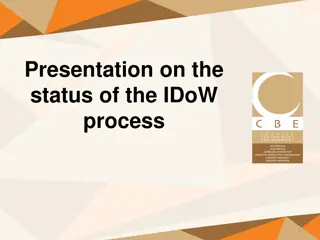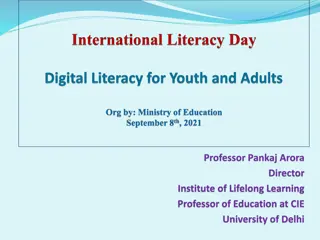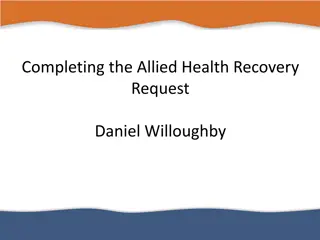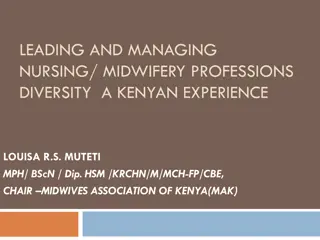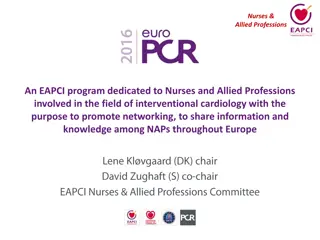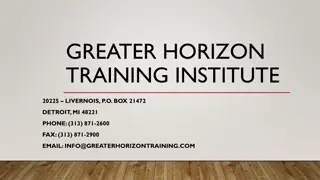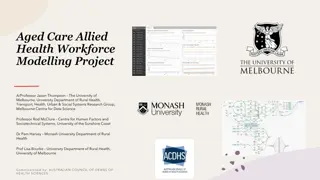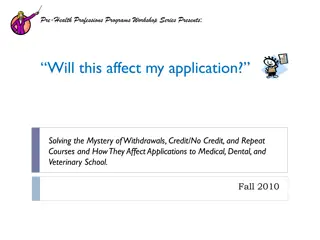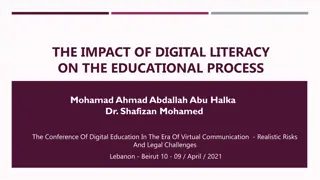Digital Literacy in Allied Health Professions
General digital understanding, attitudes, and basic abilities within the profession, including the use of electronic health records, facilitating digital learning, and implications of digital transformation in healthcare environments.
Download Presentation

Please find below an Image/Link to download the presentation.
The content on the website is provided AS IS for your information and personal use only. It may not be sold, licensed, or shared on other websites without obtaining consent from the author.If you encounter any issues during the download, it is possible that the publisher has removed the file from their server.
You are allowed to download the files provided on this website for personal or commercial use, subject to the condition that they are used lawfully. All files are the property of their respective owners.
The content on the website is provided AS IS for your information and personal use only. It may not be sold, licensed, or shared on other websites without obtaining consent from the author.
E N D
Presentation Transcript
AHP Support Worker Digital Literacy BSW Rachel Davis (n e Churchman) May 2023
General digital understanding, attitudes and basic abilities within their profession Including ability to learn, competencies, continued professional development (CPD) and use of electronic health records (EHRs). Domain 1:
HOW WELL CAN YOU USE DIGITAL PLATFORMS TO RECORD YOUR OWN LEARNING AND DIRECT COLLEAGUES TO? (FOR EXAMPLE: TRAINING TRACKER, UNION WEBSITE RESOURCES, ORGANISATION S E-LIBRARIES, DIGITAL LEARNING SOLUTIONS, E-LEARNING FOR HEALTHCARE ETC) Facilitating digital learning in yourself and others: N/A (please explain): 0.0% 1 - Not at all 4.6% 5 - Very Well 17.4% 2 - Not very well 6.4% 3 - Average ability 33.0% 4 - Quite well 38.5%
HOW WELL CAN YOU FACILITATE LEARNING DIGITAL SKILLS BOTH IN YOURSELF AND YOUR PEERS / PATIENTS / STUDENTS? (DIGITAL SKILLS INCLUDE: BASIC DIGITAL SKILLS FOR THE NORMAL RUNNING OF SERVICES, HOW TO USE TECHNOLOGY TO RECORD, DIRECT AND IMPLEMENT LEARNING FOR 1 - Not at all 0.9% N/A (please explain): 0.9% 2 - Not very well 12.8% 5 - Very well 17.4% 3 - Average ability 34.9% 4 - Quite well 33.0%
DO YOU HAVE KNOWLEDGE AND UNDERSTANDING OF THE BENEFITS AND WIDER IMPLICATIONS OF DIGITAL TRANSFORMATION FOR YOUR OWN PROFESSION AND ACROSS THE WIDER HEALTHCARE ENVIRONMENT? (FOR EXAMPLE: TRANSPARENCY AND CONTINUATION OF CARE VIA INFORMATION SHARING, ACCE Awareness of the bigger picture N/A (please explain): 0.9% 1 - No knowledge and understanding 4.6% 5 - Excellent knowledge and understanding 7.4% 2 - Limited knowledge and understanding 18.5% 4 - Good knowledge and understanding 33.3% 3 - Average knowledge and understanding 35.2%
HOW WELL CAN YOU DEMONSTRATE THE IMPLICATIONS OF DIGITAL TRANSFORMATION WITHIN YOUR OWN PROFESSION? Digital transformation within allied health professions: N/A (please explain): 1.8% 1 - Not at all 6.4% 5 - Very well 7.3% 2 - Not very well 20.2% 4 - Quite well 28.4% 3 - Average ability 35.8%
HOW WELL CAN YOU APPLY APPROPRIATE DOCUMENTATION STANDARDS WITHIN YOUR ORGANISATION S ELECTRONIC HEALTH RECORD SYSTEM? (E.G. RECORDING OF INTERVENTION ON SYSTM1, LORENZO, MEDISOFT, MEDWAY, ECLIPSE, LIQUID LOGIC ETC.) Electronic Health Records (EHRs) N/A (please explain): 5.6% 1 - Not at all 7.4% 2 - Not very well 8.3% 5 - Very well 25.9% 3 - Average ability 22.2% 4 - Quite well 30.6%
DO YOU HAVE KNOWLEDGE OF, AND THE ABILITY TO DEMONSTRATE, SIMPLE COMPUTER SKILLS? FOR EXAMPLE FAMILIARITY WITH BASIC COMPUTER FUNCTIONS (EMAIL, WEB- BASED SYSTEMS, VIDEO COMMUNICATION SOFTWARE, MICROSOFT OFFICE) AND PRACTICAL USE OF APPROPRIATE DIGITAL DEV Simple computer skills 2 - Limited knowledge and ability 7.3% 5 - Excellent knowledge and ability 14.7% 3 - Average knowledge and ability 26.6% 4 - Good knowledge and ability 51.4% 1 - No knowledge and ability 0.0% N/A (please explain): 0.0%
HOW WELL CAN YOU USE VARIABLE FORMS OF DIGITAL RESOURCES TO CONTRIBUTE TO YOUR CONTINUED PROFESSIONAL DEVELOPMENT? (FOR EXAMPLE; SOCIAL MEDIA, PODCASTS, ONLINE RESEARCH, E-CPD PLATFORMS, WEBINARS, VLOGS) Continued Professional Development (CPD) N/A (please explain): 0.0% 1 - Not at all 1.8% 2 - Not very well 12.8% 5 - Very well 18.3% 3 - Average ability 29.4% 4 - Quite well 37.6%
HOW WELL CAN YOU DEMONSTRATE VALUES AND BEHAVIOURS WHICH EMBRACE DIGITAL AND TECHNOLOGICAL INNOVATION, FOCUSED ON ADVANCING QUALITY OF CARE AND DEVELOPMENT OF THE HEALTHCARE WORKFORCE? Values & behaviours towards digital & technological innovation N/A (please explain): 3.7% 1 - Not at all 0.9% 5 - Very well 8.3% 2 - Not very well 19.3% 4 - Quite well 33.9% 3 - Average ability 33.9%
HOW WELL CAN YOU FACILITATE ENGAGEMENT IN, AND REFLECTIVE VALUES AND BEHAVIOURS TOWARD, DIGITAL AND TECHNOLOGICAL INNOVATION IN THE CURRENT AND FUTURE HEALTHCARE WORKFORCE? Engagement of others towards digital innovation N/A (please explain): 4.6% 1 - Not at all 1.8% 5 - Very well 7.3% 2 - Not very well 21.1% 4 - Quite well 27.5% 3 - Average ability 37.6%
DO YOU HAVE KNOWLEDGE AND UNDERSTANDING OF THE LOCAL SUPPORT AND TRAINING RESOURCES AVAILABLE TO ENHANCE DIGITAL HEALTH LITERACY FOR BOTH PROFESSIONALS AND FOR THE PUBLIC? Signposting to digital health training: 5 - Excellent knowledge and understanding 2.8% N/A (please explain): 0.9% 1 - No knowledge and understanding 15.0% 4 - Good knowledge and understanding 17.8% 2 - Limited knowledge and understanding 36.4% 3 - Average knowledge and understanding 27.1%
HOW WELL CAN YOU DEMONSTRATE THE COMPLETION OF A BASIC DIGITAL SKILLS / TOOLS COMPETENCY? I.E. ELECTRONIC HEALTH RECORD SYSTEMS, FOUNDATIONAL LEVEL PROGRAMMES, CPD PLATFORM ETC? Records of digital competency: N/A (please explain): 2.8% 1 - Not at all 6.4% 5 - Very well 11.9% 2 - Not very well 11.9% 4 - Quite well 24.8% 3 - Average ability 42.2%
Domain 7: This section looked at the participant s abilities to perform personal professional digital functions e.g. payslips, rotas, occupational health, personal details etc.
DO YOU HAVE KNOWLEDGE AND UNDERSTANDING OF THE ELECTRONIC STAFF RECORD (ESR) / EMPLOYEE SELF-SERVE FOR APPROPRIATE FUNCTIONS? 1 - No knowledge and understanding 0.9% 5 - Excellent knowledge and understanding 7.5% 2 - Limited knowledge and understanding 9.3% ESR Knowledge N/A (please explain): 0.0% 3 - Average knowledge and understanding 31.8% 4 - Good knowledge and understanding 50.5%
How well can you access and manage the following via your ESR / Employee Self-Serve system: 120 0 0 2 2 100 40 46 50 51 80 60 36 33 29 40 32 21 20 23 25 20 6 6 3 3 4 1 1 1 0 Personal information via the ESR / Employee Self-Serve system (e.g. payslips, sickness absence etc.) Update your personal details Check your competency/training needs Enrol in online training 1 - Not at all 2 - Not very well 3 - Average ability 4 - Quite well 5 - Very well N/A
DO YOU HAVE KNOWLEDGE AND UNDERSTANDING OF YOUR ORGANISATION / DEPARTMENTAL E-ROSTERING SYSTEMS (ELECTRONIC ROTA)? 1 - No knowledge and understanding 7.3% N/A (please explain): 10.1% 5 - Excellent knowledge and understanding 9.2% E-roster knowledge 2 - Limited knowledge and understanding 17.4% 4 - Good knowledge and understanding 25.7% 3 - Average knowledge and understanding 30.3%
HOW WELL CAN YOU USE THE E-ROSTERING SYSTEM USED BY YOUR ORGANISATION/DEPARTMENT, INCLUDING VIEWING AND CHANGING YOUR OWN STATUS ON THE E- ROSTERING SCHEDULE? (FOR EXAMPLE: REQUEST LEAVE, CHECK WHO IS WORKING CERTAIN SHIFTS, REPORT YOUR PREFERRED DAYS OFF 1 - Not at all 9.3% N/A (please explain): 13.9% E-roster use 2 - Not very well 13.0% 5 - Very well 13.0% 3 - Average ability 19.4% 4 - Quite well 31.5%
HOW WELL CAN YOU NAVIGATE DIGITAL SYSTEMS TO IDENTIFY AND SELF-REFER TO STAFF OCCUPATIONAL HEALTH AND WELLBEING SERVICES? Occupational Health & Wellbeing Access: N/A (please explain): 6.4% 1 - Not at all 11.0% 5 - Very well 5.5% 4 - Quite well 22.0% 2 - Not very well 24.8% 3 - Average ability 30.3%
HOW WELL CAN YOU USE AN ON-LINE PATIENT APPOINTMENT BOOKING SYSTEMS TO RESCHEDULE, BOOK OR CANCEL PATIENT APPOINTMENTS? Booking patients online: N/A (please explain): 18.3% 1 - Not at all 21.1% 5 - Very well 14.7% 2 - Not very well 11.0% 3 - Average ability 17.4% 4 - Quite well 17.4%
DO YOU HAVE KNOWLEDGE AND UNDERSTANDING OF HOW TO RECOGNISE CLINICALLY ASSURED ON-LINE HEALTH AND CARE INFORMATION CONTENT? 5 - Excellent knowledge and understanding 4.6% N/A (please explain): 4.6% 1 - No knowledge and understanding 13.0% Clinically assured digital material knowledge: 4 - Good knowledge and understanding 25.0% 2 - Limited knowledge and understanding 22.2% 3 - Average knowledge and understanding 30.6%
HOW WELL CAN YOU DIRECT PATIENTS TO CLINICALLY ASSURED ON-LINE HEALTH AND CARE INFORMATION? (FOR EXAMPLE; NHS.UK, NICE.ORG, WHO.INT). Signposting patients to digital resources: N/A (please explain): 2.8% 1 - Not at all 10.1% 5 - Very well 13.8% 2 - Not very well 17.4% 4 - Quite well 22.0% 3 - Average ability 33.9%
HOW WELL CAN YOU IDENTIFY NON-CLINICALLY ASSURED/ INACCURATE ON-LINE HEALTH AND CARE INFORMATION? (FOR EXAMPLE SOCIAL MEDIA, APPS, E-NEWSPAPERS & MAGAZINES, FORUMS, MATERIAL BY NON- ACCREDITED SOURCES/ REPORTERS / AUTHORS ETC). Identifying non-clinically assured digital material: N/A (please explain): 0.9% 1 - Not at all 6.4% 5 - Very well 11.0% 2 - Not very well 11.9% 4 - Quite well 34.9% 3 - Average ability 34.9%
HOW WELL CAN YOU RECOMMEND OR PRESCRIBE APPROVED MOBILE HEALTH APPLICATIONS SUCH AS THE NHS APP, MHEALTH, HOPE FOR THE COMMUNITY, MDCALC OR KEELE PAIN RECORDER? N/A (please explain): 4.6% 5 - Very well 2.8% 1 - Not at all 23.9% Recommending mobile health apps: 4 - Quite well 17.4% 2 - Not very well 23.9% 3 - Average ability 27.5%
DO YOU HAVE KNOWLEDGE AND UNDERSTANDING OF DIGITALLY-ENABLED PSYCHOLOGICAL THERAPIES (ONLINE OR VIA MHEALTH APP)? (E.G. IAPT, WOEBOT HEALTH, HUB FOR HOPE) 5 - Excellent knowledge and understanding 1.8% N/A (please explain): 2.8% 4 - Good knowledge and understanding 4.6% Digital psychological therapies: 3 - Average knowledge and understanding 20.2% 1 - No knowledge and understanding 44.0% 2 - Limited knowledge and understanding 26.6%
HOW WELL CAN YOU VIEW AND / OR CAPTURE PATIENT DATA AT THE POINT OF CARE VIA: Not at all Not very well Average ability Quite well Very well N/A 14 18 16 23 19 19 21 17 4 10 3 8 12 6 6 22 6 8 11 13 20 20 20 18 18 31 15 15 24 19 10 21 15 10 10 51 44 40 37 28 26 22 HAND HELD DEVICES FOR PATIENT- REPORTED OUTCOME MEASURES AND/ OR PATIENT EXPERIENCE DATA MHEALTH WEARABLE TECHNOLOGIES FOR PERSONAL HEALTH AND EXERCISE DATA TRACKING (E.G. KIACTIVE) CONNECTED MEDICAL DEVICES TO MEASURE PATIENT PHYSICAL PARAMETERS (E.G. BLOOD PRESSURE OR BLOOD GLUCOSE READINGS) DIGITAL CAMERA TECHNOLOGY TO FACILITATE MEDICAL IMAGE CAPTURE AND RECORDING IN EHRS REMOTE MONITORING OF PATIENT EHR DATA (CLINICAL NOTES, TEST RESULTS) USE OF IMAGE EXCHANGE PORTALS REMOTE WORKING USING LAPTOPS TO RECORD YOUR INTERVENTION
DO YOU HAVE KNOWLEDGE AND UNDERSTANDING OF THE ROLE AND BENEFITS OF VIRTUAL CLINICS USING SECURE PLATFORMS VIA: No knowledge and understanding Limited knowledge and understanding Average knowledge and understanding Good knowledge and understanding Excellent knowledge and understanding N/A 12 13 19 20 13 10 12 4 3 3 5 14 10 9 21 25 22 23 20 22 32 23 23 52 52 17 23 16 14 9 TELEPHONE TEXT-ONLY MESSAGING (EMAIL, INSTANT MESSAGING) ON-LINE VIDEO PLATFORM (E.G. SKYPE, ZOOM, ATTEND ANYWHERE) INTERACTIVE MEDIA PLATFORM (E.G. PHYSITRACK) VIRTUAL REALITY/ AUGMENTED REALITY PLATFORMS
DO YOU HAVE KNOWLEDGE AND UNDERSTANDING OF THE LIMITATIONS AND COMMON PROBLEMS ASSOCIATED WITH REMOTE CARE? (INCLUDING: SUITABILITY OF PATIENTS, CONTROL OF THE ENVIRONMENT TO PREVENT REDUCTION IN DATA QUALITY, HARDWARE CAPABILITIES, MAINTENANCE OF PROFESS Problems & Limitations of virtual clinics awareness: N/A 7.4% 5 - Excellent knowledge and understanding 4.6% 1 - No knowledge and understanding 22.2% 4 - Good knowledge and understanding 16.7% 2 - Limited knowledge and understanding 24.1% 3 - Average knowledge and understanding 25.0%
HOW WELL CAN YOU USE ONLINE COMMUNICATION PLATFORMS (E.G. VIDEO CONFERENCING, E-LEARNING WEBINARS) TO PROVIDE CLINICAL TEACHING TO PROFESSIONALS WORKING REMOTELY? N/A (please explain): 8.3% 1 - Not at all 12.0% 5 - Very well 5.6% Online communication: 2 - Not very well 14.8% 4 - Quite well 22.2% 3 - Average ability 37.0%
Additional Insight
What would you find useful to widen your digital knowledge? Training Access to devices / software Protected time Signposting Communication Increase use / innovation roll out
DO YOU HAVE ANY DIFFICULTIES / BARRIERS TO PHYSICALLY ACCESSING THE NECESSARY DIGITAL DEVICES? E.G. NOT ENOUGH COMPUTERS AVAILABLE, INTERNET CONNECTIVITY ISSUES, NOT ENOUGH SOFTWARE LICENSES, BROKEN DEVICES, DISABILITY ACCESSIBILITY REQUIREMENTS NOT FULFI Do you have any difficulties / barriers to physically accessing the necessary digital devices? Yes 26.2% No 73.8%
Limited devices Poor / no mobile service Poor internet connection Not enough software licenses Reasonable adjustments not met Slow software Faulty / broken devices Limited/ not enough space to access devices
Main Assurances: 93% report average or above simple computer skills, 100% report at least limited simple computer skills. of our AHP support workforce report average or above digital literacy skills in all work areas except Digital platforms use for training is suitable for at least 3/4 of our workforce. And our staff are actively requesting more digital literacy training and showing a willingness to engage and develop. Majority have embracive attitude to future of digital healthcare 78% average < ESR use paper-free future with rotas, payslips etc. Majority (74%) do not experience physical barriers to accessing digital devices.
Key areas for development: EHR compliance would be much higher with further programme specific training and access to devices (particularly on wards). We need much more visible, shared, updated and communicated signposting to digital literacy training!! We need to have digital literacy competencies as BAU Improve the understanding of digital healthcare and innovation within their professions. Support our colleagues to feel able to facilitate engagement in others of positive, proactive digital healthcare attitudes. ESR more user friendly, especially booking training. Improved use and understanding of e-rosters is needed
Key areas for development: The ability to use online booking systems to average or above ability (only 50% at present). Knowledge on how to identify clinically assured digital content and signpost patients and colleagues toward it appropriately. Use of digital devices to view and capture data at point of care. The knowledge and understanding of using digital platforms for virtual clinics, and the common problems and limitations associated with remote working. Better accessibility to working devices and internet connection.
Recommendations What we can do now: All training and education faculties across BSW will have reviewed and updated their digital literacy training/resources by October 2023 and make contact with the BSW digital board to ensure that the digital resources that are recommended are clinically assured. They will also identify whether further training on how to identify if digital material is clinically assured requires creating or signposting to. All training and education faculties across BSW will work in collaboration with their IT/ digital departments to ensure they can provide or signpost their workforce to online digital literacy training/updates by November 2023. This will include signposting for service users to digital literacy aid. Each organisation will then present these recommendations to the BSW Academy to review the resources available to staff and how we might advertise /publish them. As a system, we understand the digital resources we can use, and promote them in a single space that our workforce can be signposted to and access- by December 2023. All organisations across BSW will incorporate a digital competency within their staff annual appraisals and/or training requirements when their appraisal framework is next due for review. Each BSW organisation s IT department to review their ESR formatting and usability, particularly booking training function, to improve the accessibility and use of it by October 2023.
Recommendations What we could do with more resources: Heads of AHP departments to identify what digital devices are already in use in their departments and evaluate any that could be better utilised or trialled. This will be escalated to a designated digital lead to oversee and facilitate the continuum of digital innovation in BSW. By March 2024 IT departments and Team managers across BSW will complete an audit of the ratio of devices to staff across all settings. BSW organisations will then report to the BSW digital transformation group for awareness what/how/where devices are still not easily accessible to staff and how as a system we can improve this. Complete a system review of where Wi-Fi connectivity works/doesn t sufficiently work across BSW, for both service users and staff, and look for recommendations to rectify this accessibility barrier.
Recommendations Where we aim to be: All organisations within BSW to establish a digital champions programme by February 2024. To promote leadership at every level, promote digital healthcare innovation, encourage peer support and an inclusive culture and provide opportunity to develop in a cost-effective matrix. Provide substantive AHP digital lead roles to facilitate BSW progressing into the second stage of maturity in the digital framework for AHPS and continuing to foster innovative change in the digital healthcare age. Digital accessibility not to be a barrier for our staff due to sufficient devices, connectivity, software licences, IT helpdesk responsivity and reasonable adjustments for our employees to perform their best at work.
Bands 6,7,8 Glimpse Small sample of data available from bands 6,7 and 8s that also completed the survey.
Full report and anonymised data available via: https://wiltshirehealthandcare.nhs.uk/about-us/freedom-of-information/ or whc.legal@nhs.net Contact: Rachel.Churchman@nhs.net : Rachel.Davis@ghc.nhs.uk
